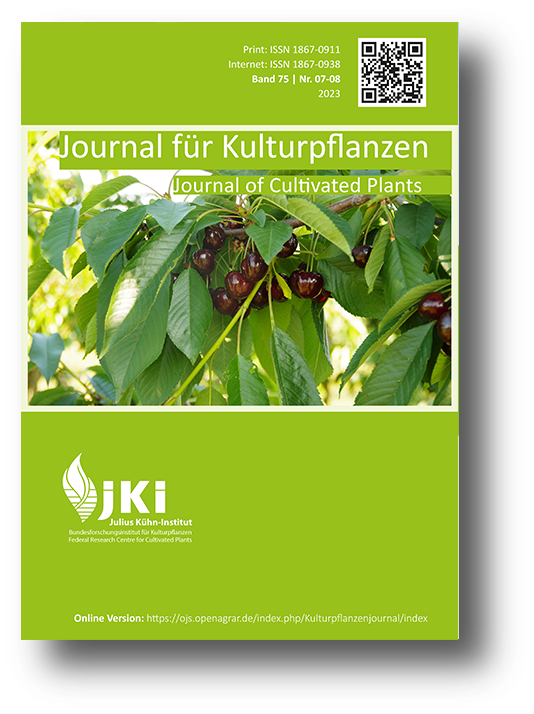Impact of mulch and irrigation treatment on growth, yield and fruit mass of sweet cherry
DOI:
https://doi.org/10.5073/JfK.2023.07-08.02Keywords:
soil organic matter, Prunus avium, grass clippigs, stem diameter, nitrogen, straw, tensiometerAbstract
In an experimental orchard of the sweet cherry cultivar 'Bedel' (Bellise®)/Gisela 5 (planting distance: 4.25 m × 2.35 m), the influence of mulching the tree row (brick fragments, lawn clippings, spruce wood shavings, barley straw) as well as two different irrigation treatments on growth, yield and fruit mass of the trees was studied in the years 2009–2018 and compared with the performance of an unirrigated control without mulching. In the two irrigation treatments, the amount of water applied per tree was compared between daily irrigation until harvest (cell division and stone hardening phase: 2–4 l; cell extension phase: 4–8 l) and irrigation according to the soil water potential in 25 cm depth (200 hPa).
The annual precipitation varied between 340 mm and 640 mm during the trial period. The annual amount of irrigation water applied varied between 37 m3 ha-1 and 350 m3 ha-1. By irrigating the trees according to the soil water potential, it was possible to reduce the pre-harvest irrigation by 24 % on average over the years compared to daily-irrigated trees, without any negative effect on yield and fruit quality. By mulching the tree row (without additional irrigation), the yield could be increased by 2.4 kg per tree on average over the years compared to the control, and by 0.7 kg per tree compared to the irrigated trees. Mulching with grass clippings led to the highest yields per tree in four of the nine years.
The results show that mulching of the tree row without additional irrigation can be seen as an alternative to irrigation for sweet cherry cultivars in the early ripening segment grown on a silty soil.
Downloads
Published
Issue
Section
License
Copyright (c) 2023 Martin Penzel, Monika Möhler

This work is licensed under a Creative Commons Attribution 4.0 International License.
The content of the journal is licensed under the Creative Commons Attribution 4.0 License. Any user is free to share and adapt (remix, transform, build upon) the content as long as the original publication is attributed (authors, title, year, journal, issue, pages).
The copyright of the published work remains with the authors. The authors grant the Journal of Cultivated Plants, the Julius Kühn-Institut and the OpenAgrar repository the non-exclusive right to distribute and exploit the work.







